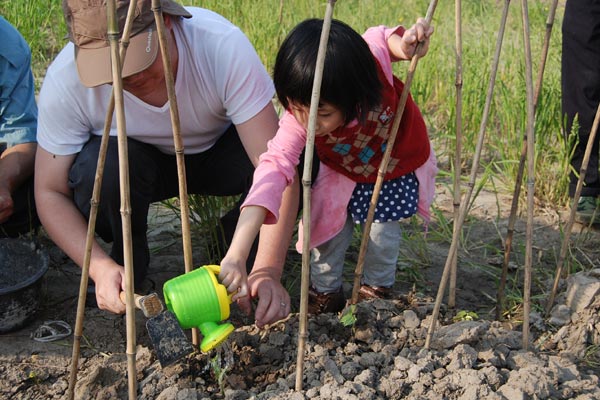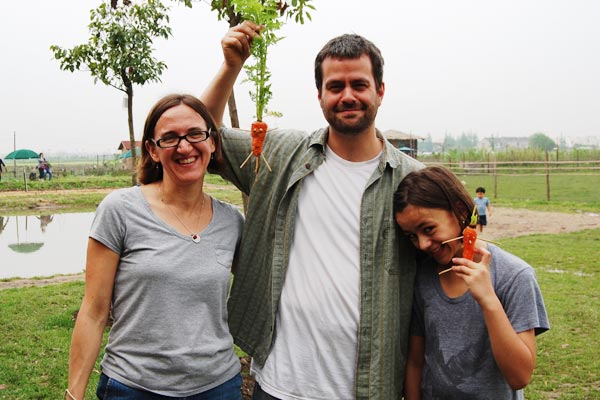And in Shanghai, they got bored
 |
|
Pan Tao, founder of Ego Land Farm, and daughter Lily enjoy working in the Schrebergarten. Photos Provided to China Daily |
 |
| Pan Tao's friends show off freshly harvested carrots. |
It's all very well to play farmer for a while, but a steady commitment to a vegetable plot is often the hardest to maintain. Xu Junqian and Zhou Qinnan find out why there are so many abandoned plots in the Shanghai countryside.
It may be fun to put on an old straw hat and rubber boots, drive away from the hustle and bustle of the city to the countryside, plow a few troughs, and take some photographs with the cows and fowls. Occasionally.
The problem is when you have to commit time to a weekly routine that requires no less patience than bringing up a baby, or taking care of a pet. That's when the passion dulls.
The "back-to-nature" trend that hit Shanghai urbanites a few years ago, is now about as neglected as the patches of land they had so enthusiastically tended. The poor plots are now overgrown with weeds.
Around 2008, in response to a series of food safety issues that had surfaced, many Shanghai citizens, partly inspired by the popular online game Happy Farm, forked out piles of cash in exchange for plots of land that they watered with good intentions.
They were determined to take charge of the supply of vegetables to their dining tables, as suggested by one of the banners blazing across the entrance of an allotment farm.
But as the years passed, the once crowded weekend "happy farms" have fallen to waste, and the crops the city-farmers so lovingly planted have been left to ripen and rot.
"The number of customers has dropped by at least 50 percent," says Li Mengzhang, from Daxun Shenguoyuan Farm in Shanghai's Chongming district.
"Most people simply don't have the patience to plow the land and sow the seeds, weeding and fertilizing before the final harvest."
A former real estate agent and the father of a 13-year-old girl, Li started his 20,000-square-meter farm and later expanded it to 30,000 square meters in 2009.
"We saw organic food as a very lucrative market and had complete confidence in our new venture," the 43-year-old recalls.
"But as it turns out, people were mainly focused on food. They are not into the process of how the food is produced."
Shenguoyuan Farm, which Li defines as an organic food club, now has a membership of about 40, and most of the members are content to pay only occasional visits.
The large majority is more interested in getting produce from the farm.
"We still reserve a small area for members to experience farm work from time to time," he says, "but only for fun".
Yang Junwei, one of the early advocates of the "back to nature" farming trend, shares some of the difficulties of being a weekend farmer.
"It's tiring enough to drive four to five hours a day to get to these places, let alone toil on the land," says Yang, a landscape designer.
He connected with the movement when several farms became clients of his firm, asking for help to "beautify" their yards.
"It's more like a tourism fad," as he defines it.
"You can't have people traveling to the same place every week doing the same thing, unless it's especially fun.






















